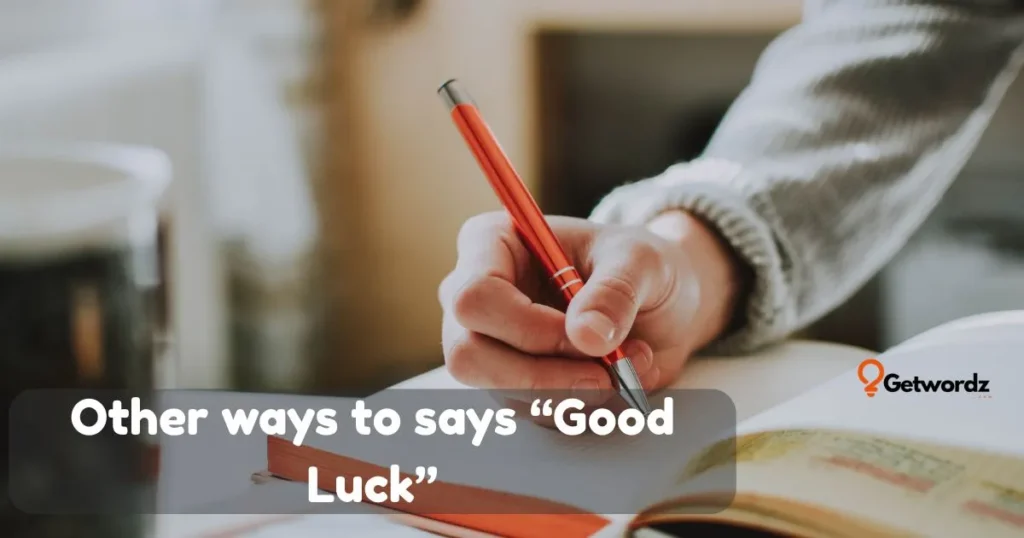“Good Luck” , two simple words we’ve all said a thousand times. Before an exam, a job interview, a big trip, or even a first date , it’s our go-to phrase for wishing someone well. But here’s the truth: “Good luck” has become so common that it sometimes feels, well, ordinary. If you’ve ever typed it out and thought, “This sounds too plain,” you’re not alone.
People everywhere are searching for creative, unique, and heartfelt ways to say “Good luck” , words that feel genuine, personal, and full of positive energy. Whether you’re cheering on a friend chasing a dream, sending love to your partner before a challenge, or motivating a coworker for success, your message deserves to sound special.
In this post, you’ll discover fresh alternatives, clever expressions, and better ways to say “Good luck” that truly connect. From funny twists to inspiring phrases, each option helps you express encouragement in your own authentic voice.
Ready to go beyond the ordinary and make your wishes unforgettable? Let’s explore the most creative ways to say “Good luck” that people will actually remember.
1. Best of Luck
Scenario: You’re sending a quick message to a friend before an important test or interview. You want to sound sincere but still keep it short and natural.
Explanation: “Best of luck” is a timeless, friendly alternative to good luck. It feels genuine and warm while still being casual enough for daily use. It’s one of those creative alternatives that fit both personal and professional contexts.
Examples:
- “Best of luck on your presentation today , you’ve got this!”
- “Sending you the best of luck for your big day.”
- “Best of luck in your new role; they’re lucky to have you.”
Why It Works: This phrase feels classic yet heartfelt. It adds a little extra warmth and polish to your message without sounding repetitive or formal.
2. Wishing You All the Best
Scenario: You’re writing a farewell card for a colleague who’s leaving the company. You want to show support in a polished, positive way.
Explanation: “Wishing you all the best” is a thoughtful and elegant expression that conveys genuine care. It’s ideal for both professional and personal settings, making it a better way to say good luck when you want to sound kind and respectful.
Examples:
- “Wishing you all the best on your new journey!”
- “Wishing you all the best for your upcoming adventure.”
- “Wishing you all the best in everything you do.”
Why It Works: It’s a graceful phrase that adds sincerity and formality while keeping your message warm and uplifting.
3. You’ve Got This
Scenario: Your best friend is nervous before a big audition. You want to boost their confidence without using clichés.
Explanation: “You’ve got this” is a motivational and empowering phrase that replaces good luck with confidence and belief. It’s a modern, supportive expression perfect for friends, family, or teammates.
Examples:
- “Don’t stress about the test , you’ve got this!”
- “You’ve got this! Just stay calm and do your best.”
- “No doubt about it , you’ve got this, champ.”
Why It Works: It replaces luck with encouragement. It tells someone you believe in them, which often means more than luck itself.
4. Fingers Crossed
Scenario: Your coworker just submitted an important proposal, and you want to show your hopeful support.
Explanation: “Fingers crossed” is a fun and friendly way to wish someone success. It’s casual, slightly playful, and perfect for text messages or lighthearted chats.
Examples:
- “Fingers crossed your idea gets approved!”
- “Fingers crossed for great news tomorrow.”
- “Fingers crossed everything goes smoothly!”
Why It Works: It adds a visual, emotional touch , showing shared anticipation and positivity.
5. Knock ’Em Dead
Scenario: Your friend is about to perform on stage, and you want to send a boost of energy and confidence.
Explanation: “Knock ’em dead” is a bold, expressive, and confident alternative to good luck. It carries excitement and enthusiasm , great for creative or high-energy situations.
Examples:
- “You’ll do amazing , go knock ’em dead tonight!”
- “Knock ’em dead at your interview; they’ll love you.”
- “It’s your moment , go knock ’em dead!”
Why It Works: It replaces luck with confidence and action. It’s vibrant, memorable, and fun to say.
Read more: 30 Other Ways To Say “Hot” With Examples!
6. You’re Going to Crush It
Scenario: A friend is prepping for a big presentation and feels nervous.
Explanation: This phrase is a motivational, upbeat alternative that shows belief in someone’s abilities. It’s commonly used in workplaces, friendships, and social posts.
Examples:
- “You’re going to crush it tomorrow , I know it.”
- “Go crush it at your audition!”
- “You’ve practiced hard; you’re going to crush it.”
Why It Works: It’s full of positivity and strength , a modern, confident way to wish someone success.
7. Sending Positive Vibes
Scenario: Your friend is waiting for medical test results, and you want to show gentle encouragement.
Explanation: “Sending positive vibes” is a warm, caring, and spiritual alternative to good luck. It emphasizes empathy and emotional support.
Examples:
- “Sending positive vibes your way today.”
- “Positive vibes for a great outcome!”
- “I’m sending positive vibes and love your way.”
Why It Works: It blends optimism and compassion, perfect for heartfelt or sensitive moments.
8. May Fortune Favor You
Scenario: You’re wishing a friend success before a big competition.
Explanation: “May fortune favor you” is a poetic, slightly formal variation of good luck. It sounds powerful and timeless , ideal for speeches, messages, or toasts.
Examples:
- “May fortune favor you in this journey.”
- “Go boldly , may fortune favor your courage.”
- “As you begin, may fortune favor your path.”
Why It Works: It elevates your message with elegance and depth, making your wish memorable and unique.
9. Break a Leg
Scenario: Your actor friend is about to perform, and you want to send encouragement the theatrical way.
Explanation: “Break a leg” is a classic stage expression meaning “do your best.” It’s playful, ironic, and full of tradition.
Examples:
- “Break a leg tonight , you’re going to shine!”
- “Break a leg on your debut performance.”
- “Can’t wait to see you on stage , break a leg!”
Why It Works: It’s fun, memorable, and rich with cultural meaning , the perfect creative spin on good luck.
10. Rooting for You
Scenario: A loved one is chasing a goal, and you want to show steady support.
Explanation: “Rooting for you” is a friendly, heartfelt phrase that means you’re cheering someone on. It’s a simple yet meaningful alternative to good luck.
Examples:
- “Always rooting for you and your dreams!”
- “I’ll be rooting for you from here.”
- “No matter what happens, I’m rooting for you.”
Why It Works: It’s emotional and sincere , showing loyalty and belief, not just hope.
11. Go Get ’Em“
Scenario: Your friend is heading into a sports game or a big competition, and you want to pump them up.
Explanation: “Go get ’em” is an energetic and casual alternative to good luck. It adds excitement and shows enthusiasm, making it perfect for friends, teammates, or social media encouragement.
Examples:
- “Go get ’em at the championship today!”
- “You’ve trained hard , go get ’em!”
- “Go get ’em and show them what you’ve got!”
Why It Works: It’s lively, motivating, and conveys confidence, making your support feel dynamic and personal.
12. All the Best
Scenario: Sending a simple, heartfelt message before someone starts a new job or challenge.
Explanation: “All the best” is a classic, versatile phrase. It works well in casual and formal contexts, offering a better way to say good luck without being overused.
Examples:
- “All the best for your new adventure!”
- “Wishing you all the best with your presentation.”
- “All the best in everything you do.”
Why It Works: It’s short, clear, and universally understood, making it a reliable, warm alternative.
13. Wishing You Success
Scenario: Your colleague is launching a new project or initiative, and you want to express support.
Explanation: “Wishing you success” is a professional and encouraging alternative to good luck. It emphasizes achievement and positivity, suitable for work or formal occasions.
Examples:
- “Wishing you success with the new campaign.”
- “I’m wishing you success in your upcoming presentation.”
- “Wishing you success in all your endeavors.”
Why It Works: It’s motivating and professional, demonstrating both encouragement and respect.
14. Hope It Goes Well
Scenario: Your friend is nervous about a casual interview, performance, or meeting.
Explanation: “Hope it goes well” is friendly and approachable. It’s a gentle, personal alternative to good luck that works in everyday conversations.
Examples:
- “Hope it goes well today , I know you’ll do great.”
- “Hope it goes well with your presentation.”
- “Hope it goes well at your audition!”
Why It Works: It’s natural, empathetic, and easy to use, making it feel sincere and genuine.
15. Wishing You the Best of Luck
Scenario: Sending a card or message before an important event or milestone.
Explanation: This phrase is slightly longer than good luck and adds a touch of formality and warmth. It’s an expressive alternative that feels thoughtful and authentic.
Examples:
- “Wishing you the best of luck with your exams.”
- “Wishing you the best of luck for the big day.”
- “Wishing you the best of luck in your new role.”
Why It Works: It balances warmth and professionalism, giving your wish a polished, heartfelt tone.
Read more: 30 Other Ways To Say “Thank You For Your Quick Response”
16. Hope Everything Goes Smoothly
Scenario: A friend is nervous about a complex task or a series of events.
Explanation: This alternative emphasizes a smooth outcome rather than luck, making it practical and caring. It’s a thoughtful, supportive phrase for personal or professional use.
Examples:
- “Hope everything goes smoothly during your presentation.”
- “Hope everything goes smoothly with your move.”
- “Hope everything goes smoothly at your appointment.”
Why It Works: It shows attentiveness and care while avoiding clichés, making your message feel unique.
17. May Luck Be on Your Side
Scenario: Sending encouragement before a game, competition, or contest.
Explanation: “May luck be on your side” is a slightly playful and classic alternative. It’s ideal for informal messages and adds a positive, hopeful tone.
Examples:
- “May luck be on your side in the tournament!”
- “May luck be on your side for the job interview.”
- “Wishing you may luck be on your side today.”
Why It Works: It’s uplifting and memorable, keeping the sentiment of luck while sounding fresh and engaging.
18. Hope You Nail It
Scenario: A friend is nervous about a performance, pitch, or presentation.
Explanation: “Hope you nail it” is casual, modern, and encouraging. It conveys confidence in the person’s abilities instead of relying solely on luck.
Examples:
- “Hope you nail it at your audition!”
- “Hope you nail it during your pitch today.”
- “Hope you nail it in your exam , you’re prepared.”
Why It Works: It’s motivating, upbeat, and personal, adding energy and belief to your message.
19. Rooting for Your Success
Scenario: A family member or friend is starting a new venture or challenge.
Explanation: “Rooting for your success” is a supportive and professional alternative. It conveys encouragement, belief, and emotional backing.
Examples:
- “I’m rooting for your success in the new project.”
- “Rooting for your success at the competition.”
- “Always rooting for your success in everything you do.”
Why It Works: It’s sincere, versatile, and emphasizes emotional support beyond the ordinary good luck.
20. Give It Your Best Shot
Scenario: Someone is trying something new and wants motivation before the effort.
Explanation: “Give it your best shot” is empowering and energetic. It encourages effort and confidence rather than relying purely on luck.
Examples:
- “Give it your best shot during the presentation!”
- “Give it your best shot , you’ll impress everyone.”
- “Give it your best shot at the competition today.”
Why It Works: It focuses on action and confidence, inspiring the person to do their best with encouragement.
21. Wishing You Nothing But Success
Scenario: Your friend is starting a business, a new job, or any major life milestone.
Explanation: “Wishing you nothing but success” is a warm and motivating alternative to good luck. It communicates positivity and genuine hope for achievement.
Examples:
- “Wishing you nothing but success in your new venture.”
- “Wishing you nothing but success for your presentation tomorrow.”
- “Wishing you nothing but success as you begin this exciting chapter.”
Why It Works: It’s optimistic, heartfelt, and emphasizes genuine support for someone’s goals.
22. Break a Sweat
Scenario: Your friend is heading to a challenging physical or mental task, like sports or an exam.
Explanation: “Break a sweat” is a playful and motivational alternative. It encourages effort and determination while keeping the tone light and supportive.
Examples:
- “Break a sweat and show them what you’ve got!”
- “Time to break a sweat and ace that workout.”
- “Break a sweat during your game , I know you can do it.”
Why It Works: It’s energetic, motivating, and fun, giving encouragement beyond just wishing luck.
23. Go for It
Scenario: A friend is hesitant but ready to take on a new opportunity or challenge.
Explanation: “Go for it” is a casual, enthusiastic alternative. It communicates confidence and permission to take action.
Examples:
- “Go for it , this could be your moment!”
- “Go for it and make it amazing.”
- “Go for it, you’ve prepared well and are ready.”
Why It Works: It’s simple, empowering, and encourages action rather than relying on chance.
24. Wishing You Good Fortune
Scenario: Someone is about to embark on a long journey, big purchase, or significant decision.
Explanation: “Wishing you good fortune” is a slightly formal, elegant alternative. It conveys thoughtful hope and positivity.
Examples:
- “Wishing you good fortune on your travels.”
- “Wishing you good fortune in all your new ventures.”
- “Wishing you good fortune with your investment decisions.”
Why It Works: It elevates your message with sophistication and genuine care.
25. Hope You Succeed
Scenario: A colleague or friend is tackling a challenging task, like a project, exam, or competition.
Explanation: “Hope you succeed” is direct, clear, and supportive. It emphasizes achievement and encouragement without being overly casual or formal.
Examples:
- “Hope you succeed in your presentation tomorrow.”
- “Hope you succeed with your new initiative.”
- “Hope you succeed in reaching your goals this year.”
Why It Works: It’s concise, meaningful, and communicates genuine support while being versatile for any situation.
Read more: 30 Other Ways To Say “After Careful Consideration”
26. May Your Efforts Pay Off
Scenario: A friend or coworker has been working hard on a project or goal.
Explanation: “May your efforts pay off” is a thoughtful, sincere alternative. It emphasizes hard work and dedication rather than relying purely on luck.
Examples:
- “May your efforts pay off during your big presentation.”
- “May your efforts pay off in the competition.”
- “May your efforts pay off as you pursue your dreams.”
Why It Works: It’s motivating, personal, and acknowledges the recipient’s hard work, adding depth to your encouragement.
27. Hope You Have a Great Outcome
Scenario: Someone is waiting for results from a test, project, or performance.
Explanation: “Hope you have a great outcome” is a friendly and thoughtful alternative. It focuses on the result while remaining positive and supportive.
Examples:
- “Hope you have a great outcome with your interview.”
- “Hope you have a great outcome on your exam.”
- “Hope you have a great outcome for your presentation today.”
Why It Works: It’s encouraging, versatile, and emphasizes positivity without overused phrases.
28. Wishing You the Very Best
Scenario: Sending encouragement before someone starts a new job, class, or life chapter.
Explanation: “Wishing you the very best” is elegant, personal, and universally understood. It’s a refined way to express support.
Examples:
- “Wishing you the very best in your new position.”
- “Wishing you the very best for your upcoming adventure.”
- “Wishing you the very best as you begin this journey.”
Why It Works: It conveys sincerity and care, making your message feel polished and heartfelt.
29. May Your Day Be Successful
Scenario: Someone has a big day ahead, like exams, interviews, or meetings.
Explanation: “May your day be successful” is clear, encouraging, and thoughtful. It’s perfect for formal or semi-formal situations.
Examples:
- “May your day be successful at the conference.”
- “May your day be successful in all your meetings.”
- “May your day be successful as you present your project.”
Why It Works: It’s precise, professional, and supportive, giving encouragement that feels intentional and considerate.
30. Make It Happen
Scenario: A friend or colleague is starting a project, event, or important task.
Explanation: “Make it happen” is an empowering, action-oriented alternative. It motivates the person to take charge and succeed.
Examples:
- “Go out there and make it happen!”
- “You’ve prepared well , now make it happen.”
- “Make it happen today, and show your skills.”
Why It Works: It’s inspiring, energetic, and shifts focus from luck to action, giving confidence and motivation.
Pros and cons of Using “Good Luck”
pros
- Simple and universally understood across cultures and contexts.
- Expresses positive intentions and encouragement in a friendly way.
- Versatile for casual, professional, and personal interactions.
- Quick and easy to say in conversation, texts, or cards.
- Can be personalized with tone or additional words to increase sincerity.
Cons
- Overused and can feel generic or impersonal.
- Lacks creativity compared to more unique alternatives.
- Sometimes considered too casual for formal or professional settings.
- Doesn’t convey effort or confidence , only hope for chance.
- May feel clichéd or repetitive if used too often in writing or speech.
Closing words
Good luck is more than just a simple phrase, it’s a way to show support, encouragement, and positivity. This post shared fresh alternatives, creative expressions, and unique ways to say good luck, helping you avoid repetitive or overused wording while keeping your messages authentic and memorable.
You can use these alternatives with friends, colleagues, or family, in cards, social media posts, or professional notes. Each phrase offers creative alternatives and fresh wording that fits any context.
Try one of these phrases in your next message to make your encouragement feel personal and genuine. Using these options improves communication by adding thoughtfulness, clarity, and impact.
Next time you want to wish someone well, these good luck alternatives will make your words feel meaningful, sincere, and memorable.




